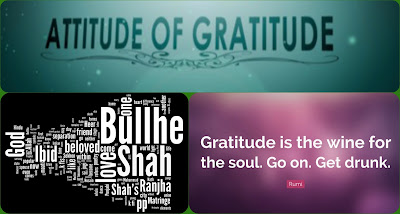Energy Management : The New Time Management
Let me start with a story this time.
Vinod is 34 years old working as Senior Manager in a MNC. He is married and has 2 beautiful kids. But things have not been going very well in his personal and professional front in the recent past. Since becoming the Senior manager, 8 months back, he's been working 12-14 hours, everyday. He looks almost always exhausted. He finds it difficult to engage with his family and often feels guilty and frustrated. He does not get more than 5-6 hours of sleep, doesn’t exercise, doesn’t eat properly; he just grabs something here and there, or while working at his desk.
Most of the corporate people can relate to Vinod’s condition. This is how we tend to respond: we put in more hours to address the rising demands of the workplace. But this takes a huge toll on one’s body, physically, mentally and emotionally. And, in turn, leads to declining levels of engagement, increasing levels of distraction, high turnover rates, and soaring medical costs among employees. With remarkable consistency, these executives push themselves harder than ever to keep up and then increasingly feel they are at a breaking point.
Is putting the additional number of hours the real answer?
Someone will think Time Management can be the possible answer.
Well Time management is hyped as one of the great tools of achievement - schedule your day, allot a set amount of time for each task, and stick to your agenda to ensure success.
Some days this works well, but other days the motivation to get everything done to the best of our ability just isn't there. This seeming failure is frustrating and induces unnecessary anxiety.
The number of hours in a day is fixed, but the quantity and quality of energy available to us is not. Hence the core problem with working longer hours is that time is a finite resource.
Energy is a different story. Defined in physics as the capacity to work, energy comes from four main wellsprings in human beings: The Body, Emotions, Mind, and Spirit.
Energy management is the new concept or rather an approach that often succeeds where time management fails. Energy beats time—every time. I call it as a Z- Factor which differentiates them from normal office going executives. It represents how effective, creative and driven these executives are in their working hours.
Learning to harness whatever energy you have, whenever you have it, can reduce stress, enhance productivity, and give you the space to relax when you need to.
- The Body - Physical Energy
We all know that inadequate nutrition, exercise, sleep, and rest diminishes the basic energy levels, as well as the ability to manage emotions and attention span. Nonetheless, many executives don’t find ways to practice consistently healthy behaviors, given all the other demands in their lives.
But simple things go a long way to help manage your energy.
For instance, smaller meals of light snacks every 3 hours, instead of 2 large meals, is a great way to stabilize glucose levels over the course of the day. Try scheduling tough projects for the morning, when you know that you would be more focused.
It is proven that our body follows an “Ultradian rhythm” in which our body hits an energy trough after 90-120 minutes. Toward the end of each cycle, the body begins to crave a period of recovery. The signals include physical restlessness, yawning, hunger, and difficulty concentrating, but many of us ignore them and keep working. The consequence is that our energy reservoir—our remaining capacity—burns down as the day wears on.
To counter this, one should try adopting brief but regular breaks at specific intervals throughout the workday which can help you completely dissociate yourself from the task. The length of renewal is less important than the quality. It could range from a simple task such as walking up and down the stairs, or even getting up to talk to a colleague about something other than work, to listening to music on your phone.
Likewise, just 30 minutes of a schedule change for sleep – going to bed 30 minutes before and freezing that time – is another simple and proven sleep hack one can employ.
- The Emotions - Quality of Energy
When people are able to take more control of their emotions, they can improve the quality of their energy, regardless of the external pressures they’re facing. To be able to do this, they first must become more aware of how they feel at various points during the workday and of the impact these emotions have on their effectiveness. Most people realize that they tend to perform best when they’re feeling positive energy. Surprisingly people are not able to perform well or to lead effectively when they’re feeling any other way.
Unfortunately, without regular breaks, people are not physiologically capable of sustaining highly positive emotions for long periods. Given the relentless demands and unexpected challenges, people tend to slip into negative emotions—the fight-or-flight mode—often multiple times in a day. They become irritable and impatient, or anxious and insecure which ends up draining their mental energy and causes friction in their relationships.
Fight-or-flight emotions also make it impossible to think clearly, logically, and reflectively. To counter this executives need to learn to recognize what kinds of events trigger their negative emotions, which will help them gain greater capacity to take control of their reactions.
A simple but powerful habit for defusing negative emotions is deep abdominal breathing, known as Buying time activity. Inhaling and then exhaling slowly for five or six seconds (Our Own Kapal bhati Pranayama) induces relaxation and recovery, and turns off the fight-or-flight response. Suggested article : Meditation and Monkey mind.
Some executives develop a habit of lighting up a cigarette each time which is extremely dangerous to one's effectiveness. This breathing exercise can help one relax in such stressful situations and may be there won't be a desire for smoking.
Vinod tried this breathing exercise as an alternative, and it worked immediately for him and he no longer had the desire for a cigarette. It wasn’t the smoking but the relaxation prompted by this breathing exercise helped.
Another powerful habit that fuels positive emotions is expressing appreciation to others, a practice that seems to be as beneficial to the giver as to the receiver. Setting aside a particular time to do it vastly increases the chances of success.
Finally, people can cultivate positive emotions by learning to change the stories they tell themselves about the events in their lives. I have observed and listened to people in conflict casting themselves in the role of victim, blaming others or external circumstances for their problems.
It has been a revelation for many when they learn that they have a choice about perceiving different events and the way they interpret those facts. This is very powerful learning to tell the most hopeful and personally empowering story possible in any given situation, without denying or minimizing the facts have proven benefits.
- The Mind - Focus of Energy
Many executives view multitasking as a necessity in the face of all the demands they juggle, but it actually undermines productivity. Digital devices, notifications, emails, etc. affects the attention span of people, which has gone significantly down over time.
A perfect example of bad multitasking
The best way is to leave your desk, away from distractions. Try applying 60/10 Rule : Set a Timer for 60 minutes, Turn off your digital devices , Shut the Door and Dive with Massive Intensity into the projects that matters. Then reward yourself by pristine break for next 10 minutes walking, Listening to good songs or reading some inspirational quotes.
Finally, try practicing checking emails only twice or thrice in a day and avoid instantly replying to an email/emails unless it's urgent. Also make a pact to focus systematically on activities that have the highest impact. Most of us tend to get to all the work or rush through it at the last minute if not planned something intentionally.
Have a focused ritual where you can identify the previous night the most challenging task for the next day and they make it the priority as soon as you arrive for work.
- The Human Spirit - Energy of Meaning and Purpose
People are most energetic and motivated when their everyday work and activities are consistent with what they value most and with what gives them a sense of meaning and purpose. They feel a surge of energy, are able to focus better and demonstrate greater perseverance.
Regrettably, the high demands and fast pace of corporate life don’t leave much time to pay attention to these issues, and many people don’t even recognize meaning and purpose as potential sources of energy.
To fully tap into your energy of human spirit, you need to ask yourself 3 questions and realign accordingly to it :
- What you do best & enjoy the most at your work ?
- Am I giving time and energy to the different areas of your life, for instance, family, work, health, community or society ?
- What are and Am I Living to my core values ?
First: In order to do your best and enjoy the most, you need to identify the things that makes you feeling energized, effective, absorbed, and fulfilled.
To do so you can think of the last best experience you have had at work and what caused it? What caused that energy and positivity in you? It could be anything like devising a strategy, preparing the presentation, executing a task, etc.
Once you are able to find that establish a ritual for yourself where you are able to do more of such tasks.
Second: It’s understandable that as you climb the corporate ladder more and more responsibilities come your way. But that doesn’t mean you cannot make time for your other important aspects of your life. And this requires efforts.
You can try making a ritual to switch off your cellphone and not open your laptop once you are home, say, for 3 hours or so. This way you can focus on your family and spend quality time with them. Spend weekends doing some community or volunteering work.
Third: Practicing your core values in your everyday behavior, is a challenge for many as well. Most people are living at such a furious pace that they rarely stop to ask themselves what they stand for and who they want to be. As a consequence, they let external demands dictate their actions.
I don’t suggest that one should explicitly define their values, because the results are usually too predictable. Instead try to uncover them by asking questions that are revealing, such as, “What are the qualities that you find most off-putting when you see them in others?”
By describing what one can’t stand, they unintentionally divulge what they stand for. If you are very offended by stinginess, for example, generosity is probably one of your key values. If you are especially put off by rudeness in others, it’s likely that consideration is a high value for you.
Try establishing rituals that can help bridge the gap between the values you aspire to and how you currently behave.
Well your action must reflect that. How ? If you come late for meetings, make it a point that you finish the meetings you hold 5 minutes early (and even show up for the meeting 5 minutes early).
By religiously adhering to these three categories, you can see a greater sense of satisfaction, alignment, well-being in your lives on and off the job and fulfillment from your life and work. These will provide a positive spirit energy and help you to be more productive and efficient.
Did Vinod Got Benefited ?
The above rituals and behaviors helped Vinod to manage his energy better and also transformed his life. He set an earlier bedtime and gave up drinking & smoking, which had disrupted his sleep. As a consequence, when he woke up he felt more rested and more motivated to exercise, which he now does almost every morning. In less than two months he lost 10 kgs. After working out he now sits down with his family for breakfast. Vinod still puts in long hours on the job, but he renews himself regularly along the way. He leaves his desk for lunch and usually takes a morning and an afternoon walk outside. When he arrives at home in the evening, he’s more relaxed, happy, fit and better able to connect with his wife and children.
By establishing the above four simple energy rituals can lead to striking results. You can achieve results that are far superior to the incremental gains you might get from time management techniques.
Vinod’s message to all : To be a consistently high performer, you have to manage your energy, not your time.
Have you done Your Energy Audit lately ? If not get yourself audited here for free.
More Energy to You










